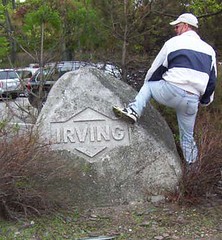

Wall Street Journal, hold the presses
Published Monday January 8th, 2007
Appeared on page A6
Leave it to The Wall Street Journal.
The Journal, one of the most prestigious names in international business news, recently ran a story on developments in New Brunswick's energy sector. The article situates Saint John in the landscape of global energy projects, pointing out to readers in New York, Houston and other major centres that this city has a deepwater port, an appetite for industrial growth, and lots of room for development, just northeast of the U.S. border.
With most of the continental U.S. closed to new energy development thanks to dense residential populations and the suburban protest, "not in my back yard," New Brunswick could become a hot destination for businesspeople interested in tapping the hungry U.S. energy market.
We're glad global business reporters are paying attention. We just wish the Journal's editors - and Canadian newspapers that reprinted the article - had gotten a little more of the background right.
For one thing, we're pretty sure it wasn't Saint John that was hit hard by the decline of Atlantic cod stocks, but St. John's, Nfld. For another, it wouldn't hurt potential investors to know Saint John has been a key player in North American energy markets for decades.
The city's industrial reputation was founded on Canada's largest oil refinery and a nuclear power plant, as well as an advanced shipyard. The refurbishment of the reactor at Point Lepreau and the construction of an LNG terminal and second oil refinery will entrench Saint John's position as the region's leading energy exporter, while drawing back much of the workforce the shipyard once employed from jobs in Alberta's crowded oil patch.
If the Journal's U.S. readership is interested in what's happening in Saint John today, we hope its reporters will keep watching. The Northeast's energy hub is just beginning to turn.
+++++++++++++++++++++++++++++++++++++++++++++++++++++++++++++++++++++++++++++++++++++++++++
WALL STREET JOURNAL
Canada Takes On Projects
Unpopular With Americans
By NORVAL SCOTT
January 4, 2007; Page A10
Saint John, New Brunswick
The oil and natural-gas industry is increasingly looking to Canada as a home for big energy projects Americans don’t want in their backyards.
A patch of coniferous forest near here, on Canada’s Atlantic coastline, represents both the promise and the challenges of that approach. The land, owned by closely held Canadian energy company Irving Oil, is earmarked for the possible construction of a 300,000-barrel-a-day crude-oil refinery that would cost $5 billion to $7 billion — the first new refinery in the U.S. or Canada in more than 25 years. Irving hopes a refinery, if it chooses to build one, would be operational by 2013.
The challenges include drawing international partners and a skilled work force to the sparsely populated area, as well as convincing locals that the changes are for the better.
The refinery development is the cornerstone of a concerted regional attempt to construct a huge “energy hub” in New Brunswick, supplying the markets of Boston and New York with gasoline, natural gas and eventually petrochemicals and related products. That would increase U.S. energy reliance on Canada, which already supplies 16% of its imported oil and oil products and about 85% of its imported natural gas.
The effort is the latest sign of increased interest just outside U.S. borders, in part to supply the U.S. market. Two liquefied-natural-gas where gas shipped from overseas in transportable liquid form will be processed for consumer use — are planned for British Columbia.
Mexico also has drawn interest. In August, an LNG terminal on the country’s east coast owned by Royal Dutch Shell PLC of the U.K., Total SA of France and Mitsui & Co. of Japan accepted its first delivery. Others are planned for Mexico’s west coast, intended to supply some gas to Southern California. But Mexico’s energy infrastructure is less-developed and the nation faces its own supply concerns.
Confronting ‘Nimby’
The rise in U.S. energy demand shows no signs of easing, despite higher prices as supplies world-wide become harder to find. The country also has been slow to invest in the infrastructure necessary to bring extra imports to consumers, due in part to concerns about the cyclical nature of the energy business. Also hurting matters is the widespread not-in-my-backyard attitude — “Nimby” for short — toward new industrial investment, which has notably delayed development of LNG terminals in the U.S.
Saint John, which is conveniently close to the U.S. Northeast, has both a natural deepwater port that could accommodate more shipping and a large amount of unused land suited for industrial development.
Irving Oil, which already has a 300,000-barrel-a-day refinery at Saint John that exports petroleum products to the U.S., also is building an LNG terminal there in conjunction with Spanish energy company Repsol YPF SA, with plans to import about one billion cubic feet of natural gas a day to meet U.S. demand.
Irving is in talks with potential partners and is gauging local support for the possible new refinery, with an eye to applying for a refining permit early this year. Local officials hope that will contribute to the economic regeneration needed by Saint John, a city hard hit by the decline of both the shipbuilding industry and Atlantic cod stocks. The campaign of New Brunswick’s recently elected premier, Shawn Graham, focused on making the province a leader in energy generation.
“Canada has been a reliable supplier of energy to the U.S., and that’s something we’d like to expand,” said Irving Oil President Kenneth Irving, grandson of the company founder. “As long as we keep getting [local] encouragement, we’re going to try our best to make this a reality.”
The company says it is negotiating with potential oil-supplying partners, though it won’t disclose names. To attract a partner, Irving is touting the potential refinery as a processor of heavier grades of crude oil, which are tougher to refine and which oil producers can find harder to sell in world markets.
Irving and local supporters hope to win locals and attract skilled labor, which has left the region in recent years due to a lack of work and the oil-sands boom in faraway Alberta. Last month, regional advocacy group Atlantic Canada published a brochure in Alberta’s major cities, seeking to draw workers back to Eastern Canada by illustrating the region’s affordable living and laid-back lifestyle.
The Irving family owns many local businesses, in fields from construction and shipbuilding to forestry and newspapers. The family’s local dominance has led some locals to question whether the regional government is holding Irving Oil to full account. In 2005, the New Brunswick legislature capped property taxes on the LNG terminal at 500,000 Canadian dollars (US$430,000) a year for 25 years. Opponents of the deal say that’s about a tenth of what U.S.-based Anadarko Petroleum Corp. will pay in taxes on the similarly-sized, though less expensive, Bear Head LNG terminal in Nova Scotia.
Power Play
“Irving Oil has so much power in Saint John and New Brunswick that people are afraid to stand up to them,” said Leland Thomas, a founding member of the group Friends of Rockwood Park, which opposes the route chosen for the pipeline to the LNG plant. “They’re not paying full value for what they’re getting.”
City officials claim the property tax cap was vital to ensure the LNG terminal was built in Saint John. At the time, Mayor Norm McFarlane said the decision “would rest well for the next 50 years here.”
Some locals still see the terminal as a safety hazard, with a terrorist attack on LNG facilities a particular concern. “We’re taking all the risk, and yet all the supplies are going to the U.S.,” said Carol Brown, a Saint John restaurateur who refuses to refuel her car at Irving Oil stations.
Irving Oil says it’s had a largely positive response from the local community. The company believes its policy of consulting with locals about the project at an early stage — before applying for any permits have been made — will enable it to convince them of its merits. “The information we’ve had so far has been very encouraging,” said Mr. Irving. “We believe this project has the right balance of aligning commercial interests along with those of the community.”
Write to Norval Scott at norval.scott@dowjones.com

3 comments:
Wow, those Irvings sure can sling the manure. Largely positive? "Yes, we get glowing reports in the local media and politicians sing our praises" states Irving:) A completely silenced terrified populace is their idea of 'positive community'.
Only Canada would be dumb enough to take all the projects americans don't want for such little benefit. At least Norway and Saudi Arabia know enough to get a cut. Energy royalties barely make a dent, the LNG terminal will only employ eight people, and a second oil refinery will add to Saint John's massive pollution that will guarantee that companies with decent jobs won't set foot near the place.
The US gets all their energy at a bargain price and can blame Canada for being such a bad polluter. Only in Canada eh!
Does anybody think that businesses don't know basic geography and have never heard of canada before? A report in the Times isn't news to investors. This was printed because the Irvings PR people know Irving is looking for partners to help build its oil refinery. How about if the province invests for a share of the profits? Oh wait, they already give Irvings everything they want for free.
What do you do anonymous, just pick a number out of your head to fit your arguments? It took all of 5 minutes to find at least 4 articles listing the number of full time jobs at the LNG termnal at 40. Do you actually even ever take the time to look things up? Or maybe your just an expert on LNG terminals. That surely must be it. That or is it when dealing with the Irvngs facts just don't matter to you?
Post a Comment